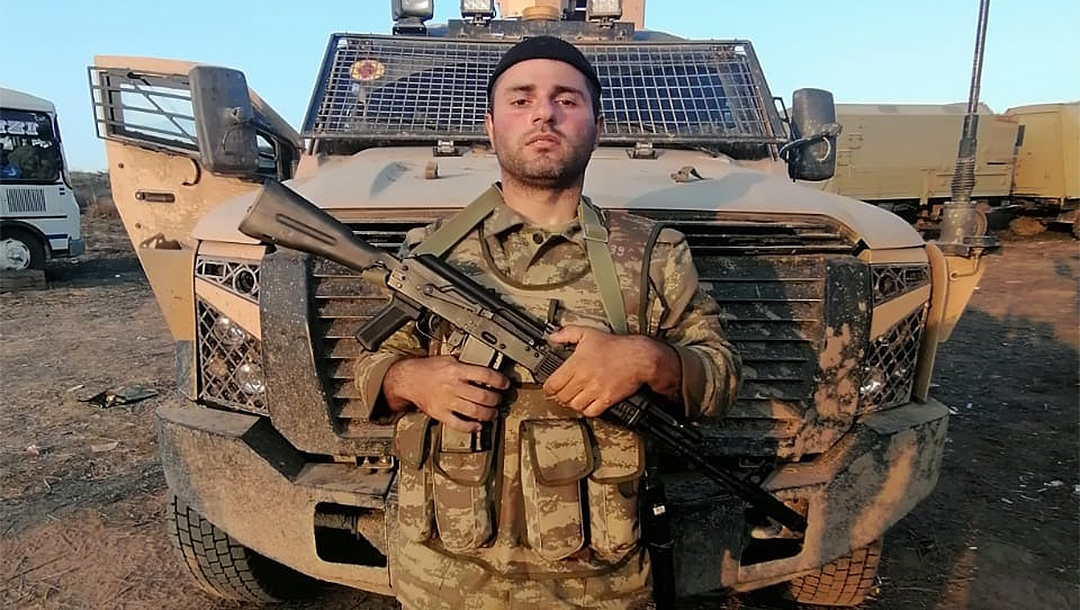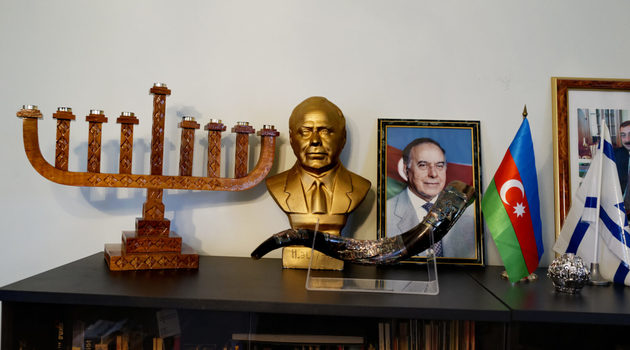For decades, Rabbi Zamir Isayev has prayed on Shabbat mornings for the government of his native Azerbaijan, a Muslim-majority nation situated northwest of Iran, Jewish Telepgraph Agency writes in the article In Azerbaijan, patriotic Jewish soldiers are poster children of the war with Armenia. Amid the recent deadly fighting between Armenia and Azerbaijan over disputed territory, he has added a special prayer for the well-being of Azerbaijan’s soldiers, which he follows up with his regular prayer for Israeli troops. “Israel is my country as a Jew. Azerbaijan is my country as an Azeri,” Isayev, 40, told the Jewish Telegraphic agency. He was born in Baku, the Azerbaijani capital, but grew up in Israel and served in its army.
Isayev’s patriotism is typical of Azeri Jews, one of the world’s oldest Jewish communities, whose synagogues often feature Azeri and Israeli flags as well as pictures of community members who gave their lives fighting for Azerbaijan and before that the Soviet Union. Isayev has additional reasons for praying for the soldiers. Dozens of members from his minority of about 8,000 people are serving in Azerbaijan’s army. One of the Jewish troops who took part in the fighting is 26-year-old David Sadiyev, a graduate of the Jewish high school in Baku. Isayev taught him to sing the Torah segment of his bar mitzvah.

“Of course I’m worried for them,” Isayev said about his former students and congregants serving in the army. “But I’m also incredibly proud of them.” “This is a country where anti-Semitism is simply not an issue,” he said. That sentiment seems to be the consensus among leaders and members of Azerbaijan’s Jewish minority. “Azerbaijan has a lot of minorities: Russians, Christians, Iranians, even Armenians,” Isayev said, “but the Jews are seen here as especially loyal and cherished allies. We’re not just another ethnic minority here.”
It’s an aspect of Azeri society that is grounded in history, according to Zeev Levin, an expert on Central Asia’s Jewish communities and a research fellow at the Truman Institute. “Jews have lived in Azerbaijan for so long that they predate much of the other populations there,” he said. “That’s in stark difference to places like Ukraine, where they arrived as outsiders and are still seen as such by many.” Even when Azerbaijan was part of the Soviet Union, Jews were allowed to keep practicing their faith, making it an exception among Soviet republics. Radical Islam has little public presence in Azerbaijan, whose capital features a prominent statue of a woman removing her veil. The “Statue of a Liberated Woman” was built in the 1960s under communism, Isayev said, “but the fact that it stayed, and has never attracted any acts of vandalism, tells you a lot.”
In Azerbaijan, Mountain Jews, or Juhuro, are the largest of three Jewish communities, followed by Ashkenazim and ethnic Georgians. With lineage dating to the Jews of ancient Persia, the Juhuro are believed to have settled in the region 1,000 years ago. They speak Juhuri, a mix of Farsi and ancient Hebrew. In Azerbaijan, many Mountain Jews either have homes or live in Krasnaiya Sloboda, a town in the country’s north where hundreds of Mountain Jews come from the rest of the country and beyond convene to visit the graves of their ancestors each year on Tisha b’Av, a day of mourning in Judaism for the destruction of the Temples in Jerusalem. But the center of Jewish life in Azerbaijan is Baku, a bustling metropolis reminiscent of Jerusalem for its mix of modern architecture, ancient Old City neighborhood – once a major stop on the Silk Road — and the light-colored stone facades of many of its buildings. Baku has six synagogues, a kosher restaurant, two Jewish schools and a Jewish kindergarten among other communal institutions.
Azerbaijan is also one of the only Muslim-majority countries in the world where the Holocaust is taught at schools as part of the mandatory curriculum. Teachers draw parallels between the Jewish genocide and the Khojaly massacre of several hundred Azeris by Armenians in the First Nagorno-Karabakh War of 1992. Israelis are often treated with friendliness, especially by army personnel and veterans inquiring about the visitors’ military service. Israel also plays a prominent role in arming and training the Azeri army – a convenient ally on the doorstep of main enemy Iran. That fact is well-known there and prompts expressions of gratitude and admiration by locals toward Israelis. But Isayev said the friendship between Israel and Azerbaijan is based on more than merely shared interests. “Jews have long been in the fabric of the people of Azerbaijan,” he said. But beyond the shared history, “The Jewish people and the Azeri people share a secret weapon that is more powerful than technology: diversity and open-mindedness.”






